The post Samantha Lai: Tackling the two sides of mental health stigma in Asian culture appeared first on .
]]> Special Guest Blogger:
Special Guest Blogger:Samantha Lai
Research Project Officer at UnitingCare Wesley Bowden
SA Mental Health Commission Youth Advisory Group member
Tackling the two sides of mental health stigma in Asian culture
As a young Australian-born Chinese, I know that everyone’s experience of mental ill-health is unique in every way.
Sure, everyone’s condition is different but there are similarities between their struggles and their stories and this blog draws upon those similarities. It is a collection of thoughts based on stories, observations and experiences of young people from Asian backgrounds surrounding me.
Everyone knows there is stigma surrounding mental ill-health. I can’t speak for other cultures, but I know that this stigma is very strong in Asian cultures. It is an unfortunate reality but as a result of this, many do suffer in silence, fail to seek help and turn to themselves for answers.
More recently, younger generations of the Asian community have become more open about their experiences of mental ill-health. But a paradox exists, especially within children of first-generation immigrant parents. These are young people who were born in let’s say Australia, the U.S., the U.K., or elsewhere, with parents from foreign countries.
Simply speaking, we have two sides of ourselves as children of first-generation immigrants. Let’s call them A and B:
Side A has some knowledge about mental health and wellbeing. These two concepts were the “hot topics” when he/she was progressing through school and as a result, Side A has some self-care practices at their disposal and is open to the idea of expressing their thoughts, feelings and emotions when times are tough.
Side B is more conservative compared to progressive and open Side A. Side B is our upbringing, our morals, our culture. Side B is that voice in the back of our minds that tells us to “be independent”, to “be tough”. To not pester others with our problems. To not disclose our problems because that’s a weakness… because we have to maintain our ‘face’, our “面子” (“mian zi”), which is our reputation… because others may start talking about us behind our backs.
Sides A and B are in constant conflict and eventually, one side wins.
Let’s say Side B wins, then you may have a young person who chooses to internalise their thoughts, feelings and emotions. And as a result, he/she may be that young person who suffers in silence, tries to manage on their own and doesn’t reach out for help.
Let’s say Side A wins, then the idea of opening up and talking about experiences with mental ill-health is less daunting. This young person may slowly ease into the idea of seeking help whether it is through friends or through professionals. But wait a second, what about family? This is when it gets interesting.
Side A is confident. They’ve already opened up to their friends. They’ve done their research and slowly progressed with the idea of seeking professional help. They may have dialled that phone number and made that one appointment. But now they’re looking for familial support for this next stretch of the journey and realises it’s now the time. The time to tell his/her parents about what’s going on in that mind of theirs.
Side A patiently waits for everyone to finish dinner, for the dishes to be washed, for family members to banter and eventually retreat back into their respective rooms before entering their parents’ room to have the “talk”.
“Mum, dad, I’m depressed”.
“Why? Why are you depressed? You’ve got it easier than us.”
“Hey, don’t go to the doctors for a diagnosis. What if your workplace finds out?”
This breaks Side A’s heart and Side B rushes back and claims the win.
Responses like these belittle our experiences with mental ill-health and force us down a thought process where we wonder whether our experiences are valid. Whether we have a right to experience these feelings of sadness and anguish because it’s true – to some extent – we do have it easier than our parents who fled war-torn countries and re-established themselves in countries where they started with absolutely nothing.
Rather than encouraging help seeking, we are encouraged to suffer in silence to maintain ‘face’ – our reputations. So, we are not seen as weak. So, we are viewed as ‘successful’ or depictions of the high standards expected of us. And we’re restricted from help seeking with constant reminders of the possible negative outcomes that could – but most probably won’t – unfold.
So, you might be wondering… How can we – “we” being the collective of young people born in Australia yet raised in Asian households – navigate this situation?
Well, the answer may vary depending on who you ask. But in my honest opinion? With encouragement, education and patience.
Firstly, encourage others to speak out, seek help and to break cultural barriers. As more people speak out about their experiences, the message of mental health travels further down the “grapevine”. This normalises mental ill-health within our culture and indirectly spreads the message to our parents.
Secondly, it is important to realise that the concept of mental ill-health is so foreign (pun-intended) to our parents. As a daughter or as a son, we must help our parents understand what mental ill-health is. Once they start to grasp the concept, they can start piecing together what’s going on and why it’s going on and become more proactive in your journey to wellness.
Thirdly, not everyone is going to grasp the concept straight away. I mean, you, yourself, may have taken some time to come to terms with what you were feeling and thinking. So, be patient as your parents take this opportunity to better understand you and to digest this information. Remember, you may have had the benefit of turning to Google for answers, but for them, you are their Google – their someone to explain things through.
And, try your best not to let this initial reaction impede your journey to wellness. You’ve taken a chance to open up and yes, it may not have panned out the way you intended it to. But in the end, you still took the chance and that is quite possibly the most courageous thing you could do!
By Samantha Lai
Research Project Officer at UnitingCare Wesley Bowden
SA Mental Health Commission Youth Advisory Group member
Samantha Lai, Research Project Officer at UnitingCare Wesley Bowden and SA Mental Health Commission Youth Advisory Group member
Sam Lai is a recent Psychology (Honours) graduate with keen interest in child and youth mental health, health education, promotion and policy. As a young researcher, she is currently involved in multiple projects which incorporate lived experience, community engagement and diversity into the mental health sector. Sam gives back to the community by being a proactive and passionate YAG member. She contributes to conversations by voicing her own lived experience, bringing insights into mental health to Asian communities and drawing on her professional knowledge.
2019 Mental Health Week: October 7–11
Special Guest Bloggers

The post Samantha Lai: Tackling the two sides of mental health stigma in Asian culture appeared first on .
]]>The post Chris Burns CSC: Intentionally focusing on wellbeing rather than mental illness appeared first on .
]]>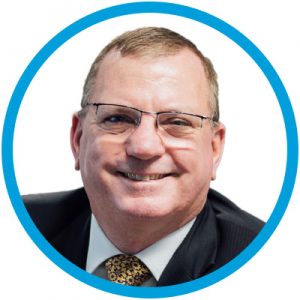 Special Guest Blogger:
Special Guest Blogger:Chris Burns CSC
SA Mental Health Commissioner
Intentionally focusing on wellbeing rather than mental illness
Wellbeing is a term often used these days, but possibly not well understood.
For some it means ‘functioning well’ for others ‘feeling positive.’
For me, it means ‘a balance of all things that determine health’.
We know factors that determine our wellbeing include: a sense of contribution and belonging in our community through work, sport or volunteering; having a safe and secure home for us and our families; enough income to meet our needs and being able to access care for our health when we need it.
As SA Mental Health Commissioner, I intentionally focus on wellbeing rather than mental illness. This is because wellbeing is not just about responding to illness through a clinical perspective, but having the things we need to build and maintain our capacity to stay mentally strong and healthy.
During Mental Health Week, we pay particular attention to how we can take good care of our wellbeing. One week is not enough – we need to do this every day.
So I invite you to practise taking care of yourself. If you are feeling well you could offer some appreciation and gratitude for that, and the things that support your wellbeing, including those social determinants such as having a job, somewhere to live and the support of family and friends.
For those of us who may feel depleted, have high levels of distress or job and housing insecurity – and that can happen to anyone – we may need help and support. We need others to help us with a bit a self-care. Asking can be difficult if you feel like you’re a burden but family and friends want you to be OK they want to hear from you.
If your wellbeing is strong and you have the capacity, why not reach out to others who may be distressed or don’t have enough support right now – maybe they don’t have a roof over their head or really need 24/7 attention for a little while? It can be as simple as sitting with them and listening, or maybe turning up with a casserole. Or simply asking: “What will help?” or “Can I take the kids for the night to give you a break?”
Wellbeing encompasses how we can take care of ourselves and/or get help from others if we experience distress, but also how we keep ourselves and support each other to stay well, which fits with our vision for South Australia to be internationally recognised as a resilient, compassionate and connected community.
We know recovery from mental distress and illness is not just possible, but likely – especially when we offer human connection and support in our community.
By Chris Burns CSC
SA Mental Health Commissioner
Chris Burns CSC, SA Mental Health Commissioner
SA Mental Health Commissioner Chris Burns CSC is a passionate advocate for strengthening the mental wellbeing of his fellow South Australians.
Chris is involved with people from all walks of life and organisations ranging from government to private enterprise as he spreads the message that good mental health starts with strong, inclusive communities and early intervention, promotion and prevention rather than acute care and emergency departments.
He prioritised and incorporated the views of South Australians as he led the development of the SA Mental Health Strategic Plan 2017–2022. Chris and his team are now implementing the Strategic Plan.
2019 Mental Health Week: October 7–11
Special Guest Bloggers

The post Chris Burns CSC: Intentionally focusing on wellbeing rather than mental illness appeared first on .
]]>The post Anna Meares OAM: Sometimes the hardest battle is getting the confidence to walk back into the big wide world appeared first on .
]]> Special Guest Blogger:
Special Guest Blogger:Anna Meares OAM
Olympic Gold Medallist
Retired champion cyclist
Sometimes the hardest battle is getting the confidence to walk back into the big wide world
For much of my life, I have had a physical coach. As Australians and as a society, we often attribute so much grandeur and encouragement towards having a physical coach.
After all, a physical coach can help us achieve sporting goals, attain our dreams, or perhaps lifestyle changes and betterment of our physical bodies.
But what is so often overlooked is the importance and integral link between the physical to the mental. While we may hang grandeur on having a physical coach, sadly we can all too easily hang stigma on having a mental coach.
I learnt very early in my life that the mind is an important tool. Ignore that and you are ignoring your chance to really be the best version of yourself, to equip yourself with the skills that can help you seek help and cope/survive some of life challenges.
My first coach Ken ‘Reggie’ Tucker saw something in me as a young kid. Short, skinny and not physically adapted yet to a strength power-based sport where size matters in the body.
For the first few years of my tutelage, Reggie worked on my head to understand racing, moves, making decisions under pressure and competition etc until my body finally caught up.
As kids, we all develop at different times and different stages. The fact that I had someone spend time with me on my head, never really hit me until I was old enough to fully understand the gift I had been given.
Fast forward a few years and in a world where physical prowess is renowned, I still understood that the mind was the engine that drove the body. Winning that battle that not only happens between opponents but between one’s own ears and you can be stronger then you ever knew.
What I have learnt is that becoming strong of the mind takes time, a measurement that is different for everyone and, it takes many occasions to break, or to fall, or to lose, or to be facing a brick wall before you realise you have a weakness, that you didn’t realise your full capacity, that you have to be in a vulnerable place in order to force yourself to ask for help.
Psychology and mindfulness have been an area I have spent great time and effort on improving. I haven’t always been strong, and a lot of the time those moments happen behind closed doors and take a great deal of effort not just from me but those around me to give me the confidence to walk back into the big wide world.
I’m naturally quite an introverted person. I struggle with large groups of people especially those I do not know. I have had to learn to read the signals my body sends me, to mentally regain control and keep moving forward. You may know me as someone who can perform in front of thousands of people, speak confidently and compete with aggression and intimidation. But I am also someone who dislikes confrontation, prefers a small audience of familiar faces and has an innate need to help and support people around me. How does the one person differ so greatly from personal circles to professional circles?
My career has been one of great success, but it has also been one that has seen great loss, adversity and challenge. I once heard Julia Gillard state that resilience is like a muscle. If you use it, it gets strong. She is right.
Being resilient is understanding you won’t always win. You will likely lose more then you win. And in understanding this, it is important to celebrate the wins when they happen for they are indeed rare, and acknowledge the battle, the fight and the adversity that’s been overcome in order to achieve it.
Finally, time.
Time is the one factor that can be the healer for all facing challenges mentally and emotionally. However, time can be the cruelest measure of all to heal an injury of the mind or the heart.
For unlike a physical injury, we cannot see it.
We cannot measure its recovery path, and it is easily re damaged by triggers, events, smells, sounds, places, words, songs, people… so many factors can affect it.
When you’re in a place in need of healing on the inside it is so hard to see past the pain, the loss and the hopelessness. For time seems to stand still. It is here that people you love and trust are crucial to you for they are your perspective.
They can see the timeline; they can see what you cannot. If you can find it in yourself to get support and trust that support, you will come out of it bouncing higher than ever before.
With the support of my psychologist, Rita Princi, I see my life like a bouncing ball. I constantly move up and down.
The harder that ball falls, the greater the impact felt at the bottom. But eventually the ball pulls itself back to center and bounces higher with as equal a force with which it fell.
I wouldn’t change anything I have experienced. Good bad or indifferent. I have had many a challenge. Both personally and professionally.
But that has all put me in the place I am now, the person I am now, and with time I have been able to see and understand, I am a good person, who has been through a lot, and has come out better on the other side.
I have the perspective I once couldn’t see and I am thankful for those who stood by me in the lows and celebrated with me the highs.
I encourage people to listen and to talk. Both are such important elements to human connectedness and belonging.
Find that trusted soul or souls who can give you this. You are worth it.
We all are.
By Anna Meares OAM
Olympic Gold Medallist, Retired champion cyclist
Anna Meares OAM, Olympic Gold Medallist, Retired champion cyclist
Retired champion cyclist and dual Olympic gold medallist Anna Meares OAM is one of Australia’s favourite sport stars.
The daughter of a coal miner, Anna rode a BMX bike in Middlemount, Queensland, and learnt her craft on an outdoor velodrome in Rockhampton.
Anna became an Olympic champion at 20 and in her 15-year international career, she collected 18 gold, 16 silver and 10 bronze medals at Olympic, World and Commonwealth Games level.
She is the first Australian to ever win four individual medals at four consecutive Olympic Games.
She fought back from a terrible cycling accident in 2008 which left her with a hairline fracture in her C2 vertebrae.
In February 2015 Anna won the women’s keirin for her 11th world track cycling title making her the most decorated and successful female track cyclist in history.
2019 Mental Health Week: October 7–11
Special Guest Bloggers

The post Anna Meares OAM: Sometimes the hardest battle is getting the confidence to walk back into the big wide world appeared first on .
]]>The post Geoff Harris: Applying human rights to mental health appeared first on .
]]>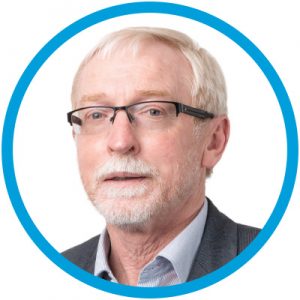 Special Guest Blogger:
Special Guest Blogger:Geoff Harris
Executive Director,
Mental Health Coalition of South Australia
Applying human rights to mental health
In August last year, Victorian human rights adviser Indigo Daya visited South Australia to talk to an audience over more than 100 people.
Little did we know how much of a chord she would strike with South Australians.
After all, most of us think that human rights are something that needs attention in Third World banana republics. Right?
Well, Indigo talked about her own experience of mental illness and the re-traumatisation that she sometimes experienced in mental health services.
She compared these experiences with the aspirations of some of the international agreements to which Australia is a signatory, including the Convention on the Rights of Persons with Disabilities.
People significantly impacted by mental illness die much younger than the rest of the population, have high levels of homelessness and experience higher levels of unemployment than their counterparts in the OECD first world.
Indigo’s proposition was clear: we fall far short of our international obligations for Australians with mental illness.
South Australians attending the event felt the same way.
So the Mental Health Coalition of SA (MHCSA), the Lived Experience Leadership Advocacy Network (LELAN), Carers SA and the Health Consumers Alliance SA took the topic out to more South Australians so we could hear their views.
South Australians with lived experience of mental illness told us they are not enjoying the full human rights in so many areas of their lives despite living in such a prosperous country.
We hosted a consultation to inform a submission that MHCSA and LELAN put to the Productivity Commission Inquiry into Mental Health. A key part of this was to put the human rights case for ensuring delivery of broader outcomes such as housing, employment and social connectedness as well as continuing to reduce restrictive practices.
We established a Human Rights and Mental Health Working Group which now meets monthly and as more and more people on this group share their experiences, it becomes even clearer how much change is needed so Australia can truly meet its international rights obligations.
Our most recent consultation, for example, was to shape a submission to Free and Equal which is ‘an Australian conversation about human rights’ hosted by the Australian Human Rights Commission.
At times, people on this Working Group are a little daunted by the complexities that we discuss and there is so much to do to redress the injustices and indignities experienced by people with mental distress.
But as I listen to depth of knowledge expressed around the table, it is pretty clear that continuing to really listen to – and understand – the perspectives coming from lived experience is the single most important ingredient in the recipe that will fix one of Australia’s poorly recognised human rights problems.
By Geoff Harris
Executive Director, Mental Health Coalition of SA
Geoff Harris, Executive Director, Mental Health Coalition of SA
Geoff Harris is the Executive Director of the Mental Health Coalition of SA (MHCSA) and has worked in mental health policy for over 20 years. The MHCSA’s mission is that everyone in SA gets the mental health support they need when they need it. The ongoing work in mental health and human rights discussed in this blog is supported by a partnership between the Lived Experience Leadership and Advocacy Network and MHCSA.
2019 Mental Health Week: October 7–11
Special Guest Bloggers

The post Geoff Harris: Applying human rights to mental health appeared first on .
]]>The post Lucy Brogden: As a carer, how do you prioritise caring for yourself? appeared first on .
]]>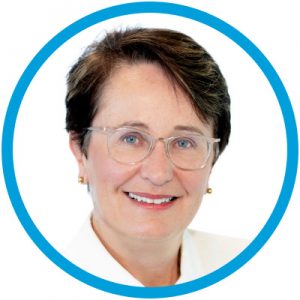 Special Guest Blogger:
Special Guest Blogger:Lucy Brogden
Chair, National Mental Health Commission
Workplace and suicide prevention champion
As a carer, how do you prioritise caring for yourself?
I love my husband but there are times when I have to shift from wife to carer. Wise, experienced carers told me early on that when you care for someone you love dearly, you can be so busy looking out for them that you forget to take care of yourself.
We all know the old adage about making sure your emotional glass is full, so you have energy left to share with others. It’s easy to say but sometimes not so easy to do.
However, in order to care for others, we can’t lose sight of how we are doing when it comes to our own mental health.
I’m not alone in the role of carer. Carers make up more than 2.7 million of Australians which means about 1 in 8 people are caring for a loved one.
I spend a lot of time advocating for carers to be heard in the mental health arena, particularly when it comes to complex, far reaching mental health system reforms that are underway and ahead of us.
With this being Mental Health Week, I am not going to talk about that aspect of my life. Today, I have been invited to share my self-care lessons, and want to tell a little more about myself from that perspective.
I wear a lot of hats each day; in my family, my community, and across my personal and professional life. I am a mother to three children; two teens and a tween. I am a sister, friend and active participant in my local community. I work in a professional capacity for as Chair of the Advisory Board for the National Mental Health Commission. I am the co-founder of the Sydney Women’s Fund and Director of Be Kind Sydney.
Sometimes that can feel like a lot. But, over the years, I have learned what I need to do to take care of myself so I can live a fulfilling, contributing life.
I’m often asked, when you spend so much of your life speaking up for others, how do you take time for yourself? How do you know when you need to pause and pay more attention to your own mental health?
In this blog post, I am simply Lucy, someone who, just like you, needs to prioritise herself and replenish her cup, no matter how many plates are spinning in her life.
One thing I learned a long time ago is how to speak up for myself when I feel like I need a break, particularly in a work context.
I know we have a long way to go when it comes to fostering mentally health workplaces but part of it starts with us being honest about how we’re feeling with a trusted colleague if we are going through a tough time outside work.
As someone who prides themselves on having a good work ethic and generally a high achiever, I admit I struggled with this at first, but it did get easier over time.
These days I’m a lot better at letting people know when I need to take the foot off the work accelerator temporarily due to personal circumstances. You don’t need to divulge personal details if you don’t feel comfortable doing that, simply saying that you have a lot going on personally is often enough.
The second thing I want to share with you is how revitalising I find time spent in our community through our surf club, Bilgola SLSC. There have been some days where I haven’t wanted to go down and do that beach patrol (particularly on rainy days) but every time I walk onto that beach and speak with someone from our club, whether I know them personally or not, it lifts me and gives me a sense of belonging.
The fact that my entire family are active in the surf club makes it even more special. We each not only benefit from the whole community but have also built our own networks of support and friendship within it.
Thirdly, I regularly take time to be by myself and read. It may sound simple, but I love getting lost in a good book or an article someone has sent me to read about one of my interests. It helps me to pause all of the other thoughts and to do lists in my mind and focuses my attention into that one thing, that one story.
Sometimes in life’s most busy moments, taking just half an hour or hour to go to a coffee shop or siting in a comfortable corner at home to catch up on reading, helps me to better manage other competing priorities afterwards.
These are just a few of the ways I take care of myself so I can live the life I want to and need to live. On any given day, one of my roles may outweigh the others due to necessity but knowing what keeps my cup full, helps me get through those days and regroup on my self-care the following day.
Like everyone, I’m not perfect. I am sometimes run down. I sometimes over commit to work and relationships. But, as a carer and as a person who values their personal wellbeing as essential to their relationships with others, taking care of me must always be on the priority list.
By Lucy Brogden
Chair, National Mental Health Commission
Lucinda Brogden AM B.Comm., M.Psych.
Lucy has a strong commitment to helping others. Her primary areas of focus are issues facing women and girls and mental health and wellbeing particularly in the workplace. She takes an evidenced-based approach to problem solving and social investment.
Lucy has more than 25 years’ commercial experience with companies including Macquarie Group and Ernst & Young working in accounting, finance and organisational psychology.
Specifically, Lucy has worked in trusted advisory roles with some of Australia’s leading CEOs, Managing Partners, Ministers and Chairs.
In 2015, Lucy was named as one of the 100 Women of Influence in Australia.
In June 2019, she was appointed a Member of the Order of Australia in the Queen’s Birthday Honours List for her significant service to workplace mental health and wellbeing.
- Chair & Commissioner, National Mental Health Commission
- Chair, Mentally Healthy Workplace Alliance
- Chair, Australian Advisory Group for Suicide Prevention
- Patron, Partners in Depression
- Patron, Lifeline Northern Beaches
- Friend, Carers NSW
- Silver Medallion, Surf Lifesaving – Patrol at Bilgola Beach
- Founder & Patron, Sydney Women’s Fund
2019 Mental Health Week: October 7–11
Special Guest Bloggers

The post Lucy Brogden: As a carer, how do you prioritise caring for yourself? appeared first on .
]]>The post Special Guest Bloggers for Mental Health Week: 2019 October 7–11 appeared first on .
]]>
The SA Mental Health Commission is featuring a series of guest bloggers on our website to mark 2019 Mental Health Week (October 7–11).
 Monday’s Blog
Monday’s Blog
by Lucy Brogden:
Chair, National Mental Health Commission Workplace and suicide prevention champion
“As a carer, how do you prioritise caring for yourself?”
 Tuesday’s Blog
Tuesday’s Blog
by Geoff Harris:
Executive Director, Mental Health Coalition of SA
“Applying human rights to mental health”
 Wednesday’s Blog
Wednesday’s Blog
by Anna Meares OAM
Olympic Gold Medallist, Retired champion cyclist
“Sometimes the hardest battle is getting the confidence to walk back into the big wide world”
 Thursday’s Blog
Thursday’s Blog
by Chris Burns CSC
SA Mental Health Commissioner
“Intentionally focusing on wellbeing rather than mental illness”
 Friday’s Blog
Friday’s Blog
by Samantha Lai
Research Project Officer at UnitingCare Wesley Bowden
SA Mental Health Commission Youth Advisory Group member
“Tackling the two sides of mental health stigma in Asian culture”
Want to find out what else is on during Mental Health Week? Check out our Facebook page or go to the Mental Health Coalition of SA’s webpage.
Mind Your Health: Your mental health is just as important as your physical health.
Let’s take care of it together.
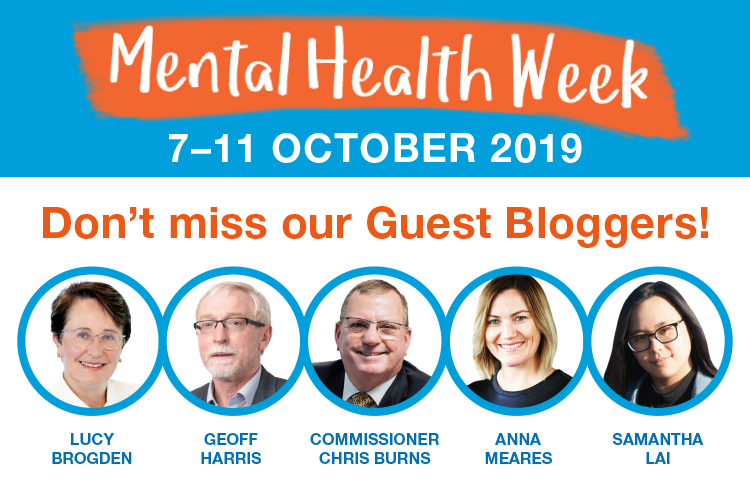
The post Special Guest Bloggers for Mental Health Week: 2019 October 7–11 appeared first on .
]]>The post Derrick McManus: Depression & PTSD hit me in unexpected ways and at an unexpected time appeared first on .
]]>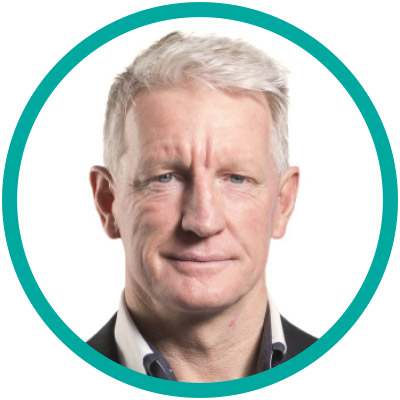 Special Guest Blogger:
Special Guest Blogger:Derrick McManus
Former police officer, author and motivational speaker
Please note this blog contains a description of a violent incident and may be disturbing for some readers.
If you need support or advice, please phone one of these national 24/7 crisis services:
Lifeline: 13 11 14 www.lifeline.org.au
Suicide Call Back Service: 1300 659 467 www.suicidecallbackservice.org.au
MensLine Australia: 1300 78 99 79 www.mensline.org.au
beyondblue: 1300 22 4636 www.beyondblue.org.au
Depression & PTSD hit me in unexpected ways and at an unexpected time
I’m a Police Officer who was shot but this is not when I experienced depression and PTSD.
A couple of years after the shooting I had what I thought to be less challenging experiences and was diagnosed with depression and PTSD. Only afterwards did I understand how and why it affected me.
I had been a member of the SA Police Special Tasks And Rescue (STAR) Group. We were responsible for the safe resolution of high-risk and violent incidents. It is a seriously high-stress environment.
In 1994 we went to arrest an offender and he started shooting. I was shot 14 times in less than 5 seconds and lay on the ground for 3 hours before rescue. If I were ever going to suffer anxiety, depression or PTSD, I would have expected to do so following this event.
After this terrible event, I was eventually psychologically cleared to return to work, by renowned trauma psychologist, Professor Sandy McFarlane, even though we both knew I wouldn’t be physically fit enough for at least 18 months. He also reinforced how depression and PTSD might still affect me in the future and explained what I needed to do.
A couple of years after the shooting my marriage broke down and we separated. It was my choice but I hated it. I desperately missed 24/7 access to my children, being able to see them and hug them. I was living alone. I had visitors and work colleagues but still felt lonely. My 13-year-old Rottweiler dog died around the same time. It was really tough but others had gone through marriage break ups so I thought I could too.
During this time I was also fighting to get back into STAR Group. I knew I had to prove my capability both physically and psychologically. My superiors told me that they wanted me to pass the tests to return to STAR Group but then it seemed as if they were making the tests impossible once testing got underway.
Professor McFarlane had psychologically cleared me, so surely there should be no question about that.
I had been assessed by an Occupational Therapist as being capable of completing all STAR Group tasks, the same as everyone else, so surely there should be no question about that.
When my fitness and agility was tested, I passed with flying colours. To my surprise I was tested again with a harder test and again passed. I was tested yet again with an even harder test. This seemed to continue forever but I passed every test and went back into STAR Group.
Even though I had passed everything, I felt that people at the top (my superiors) were always watching and waiting for me to show signs of failure, ready to pounce. With everything else that was happening, the stress was building up but I really didn’t recognise any signs of depression and PTSD.
What I eventually recognised was that I wasn’t sleeping well and that I was worried about constant scrutiny. I was no longer training as hard as I had in the past; I didn’t have any interest in talking to people unless I had to; and I wasn’t eating well either. For a couple of months I only cleaned my teeth about 4 times. I don’t know why but it didn’t even occur to me that anyone would notice. I now know these are signs of depression but I didn’t recognise as that at the time.
I eventually decided I needed to fix something and I was convinced that it was just my diet. I went to the doctor and specifically asked him to give me a blood test and tell me what vitamins I needed to add to get my energy back again.
To my surprise I was asked to complete the depression / PTSD questionnaire. I was diagnosed with mild depression and PTSD. This shocked me!
However, I always knew and accepted that depression and PTSD might affect me. It can affect anyone.
I didn’t try to say “I’m too tough for this”. I didn’t fight it, I didn’t try to deny this could happen to me. I immediately knew that catching this early was a good thing and resolving it was always possible. So I embraced and did everything the doctor recommended for me.
He advised me about the signs and symptoms to look out for and strategies to manage them and I continued to work in STAR Group, doing what I loved and left some years later.
I speak openly about my experience with depression and PTSD. I reinforce to all that anyone can experience it. It is often not triggered by a single incident, but the accumulation of stress or stressors and it can have an affect at any time.
I now recognise low periods in my life, when stress could be leading to depression. However, I now have an awareness of when to deal with it myself, when I need to talk to a friend and when I need to seek professional advice.
Depression and PTSD affected my life but through the right advice, assistance and management it’s not controlling my life anymore.
By Derrick McManus
Former police officer, author and motivational speaker
Derrick McManus – Former police officer, author and motivational speaker
Derrick McManus is an author and motivational speaker on the importance of resilience and durability, drawing on his experiences at South Australia’s longest siege in 1994. A member of the South Australia Police for over 30 years, Derrick’s awards include the Australia Day Young Citizen of the Year Award for extensive work in the community and the inaugural SA Police Bravery Medal.
Mr McManus now lectures groups on the durability of human performance and is a White Ribbon supporter. He regularly speaks to groups of men about the need to avoid reacting to situations with violence.
2018 Mental Health Week: October 7–13
Special Guest Bloggers

The post Derrick McManus: Depression & PTSD hit me in unexpected ways and at an unexpected time appeared first on .
]]>The post Chris Burns: Peer Support Workers – the disruptor we need in mental health appeared first on .
]]>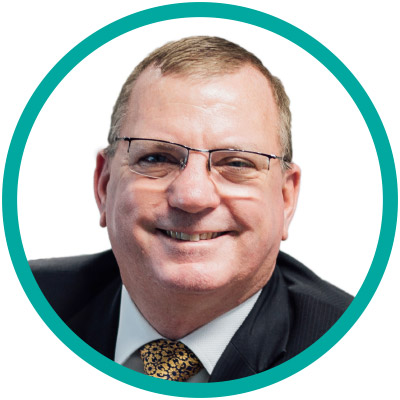 Special Guest Blogger:
Special Guest Blogger:Chris Burns CSC
SA Mental Health Commissioner
Commissioner Burns’ blog is based on his recent 57th Barton Pope Lecture, delivered during 2018 Mental Health Week. The Lecture is available to download below.
Peer Support Workers – the disruptor we need in mental health
When you analyse the Australian Institute of Health and Wellbeing 2015–16 data, our state is well served in terms of mental health and wellbeing.
It is evident we have a highly professional, hard-working and committed mental health workforce in South Australia.
By comparison with all other states on a per head of population basis we are second only to the ACT in specialised mental health care Salaried Medical Officers (mainly Psychiatrists).
We blitz the other states with the highest number of mental health nurses per head of population.
And we just pip the westies with the highest number of mental health related allied health workers per head of population. Figures show that South Australia spends 14% more than the national average on a per capita basis on mental health services – the third highest in Australia after the Northern Territory and ACT.
Our average length of stay is 10.5 days across acute inpatient units compared to the national average of 13.2 days. According to the Australian Institute of Health and Wellbeing’s latest statistics, South Australia had 39.4 inpatient and residential beds per 100,000 of population compared to the national average of 36.7 beds.
Interestingly, South Australia has the highest rate of mental health presentations to emergency departments in Australia at 4.8% versus the national average of 3.6%.
So, by many measures our state has the resources it needs to run a good mental health service.
Which begs the question – why are our clinicians and medical staff so stretched?
What those statistics don’t reveal is how effectively and efficiently we are using our resources.
Over the decades, multiple reviews have been conducted with too numerous recommendations made and relatively few enacted. So, is there a non-clinical option? I do believe there is a disrupter that is worthy of consideration.
We need to free-up our clinicians to allow them to focus on those that are truly in need of their care and make best use of our limited and expensive clinical resources.
We currently have a very ad hoc and small peer workforce spread across our public, private and non-government sectors. An essential criterion for a peer worker is that they have lived experience of mental illness, as a consumer and/or a carer.
Peer support involves training people with their own lived experience of a mental health issue to support and guide others who have further to go on their recovery journeys.
This enables them to sit beside someone experiencing mental ill health, or a carer, and empathise with them while providing support and guiding them through their recovery journey.
It’s often the case that people in need of help will relate with and learn from peers who have ‘walked the walk’ of mental health recovery.
Peer support is now seen as a pillar of mental health recovery, a reliable and cost-effective way of guiding people with mental health issues to meaningful and independent community living.
Peer workers complement the work of clinicians, they don’t contradict it.
We’ve seen some great examples interstate and overseas of professionalised peer workforces in the mental health arena. In these workforces, individuals are screened for suitability and carefully selected through a merit-based process.
They are trained and supervised.
There is an established career structure with the opportunity to improve their skills through further training and experience. Experience of peer workers and clinicians combining in crisis response and management overseas has demonstrated significant reductions in first responder workloads, emergency department appearances and acute bed occupancies.
A peer workforce does not need to be government employed.
Overseas experience demonstrates alternatives that are commercially viable and deliver significant savings while freeing up clinicians to perform their vitally important roles.
It is difficult to imagine an aspect of our society that would not benefit from a professionalised peer workforce. From crisis response and management to inpatient care.
Peer workers could deliver resilience and positive psychology programs in our schools, universities and tafes; freeing–up our teachers and instructors to do what they do best – educating our next generations of South Australians.
Peer workers could support employers to maintain mentally healthy workplaces and they can support our older persons. They have a place in our courts, the corrections system, with first responders, in sports clubs and in the broader community.
I truly believe we need to take a serious look at developing a professionalised mental health peer workforce to augment and enhance the existing highly capable clinical mental health workforce we have in South Australia.
We have a vision to be a resilient, compassionate and connected community focused on building, sustaining and strengthening the mental health and wellbeing of South Australians in order to grow the State’s mental wealth.
That is an achievable vision provided we think outside the box and look for other options that might prevent mentally unwell South Australians appearing in our Emergency Departments and occupying acute beds. A professionalised mental health peer workforce is but one of those options.
By Chris Burns CSC
SA Mental Health Commissioner
Chris Burns CSC – SA Mental Health Commissioner
Chris Burns became the inaugural South Australian Mental Health Commissioner in July 2016.
An experienced advocate and strategic planner, Chris is a former military officer and consultant in defence and international relations. Most recently, he was the CEO of South Australia’s defence industry association successfully campaigning for the Australian Navy’s next fleet of submarines and surface ships to be built in Australia. In leading the SA Mental Health Commission, Chris is focussed on taking a holistic approach to strengthening the mental health and wellbeing of South Australians in order to grow the state’s mental wealth.
2018 Mental Health Week: October 7–13
Special Guest Bloggers

The post Chris Burns: Peer Support Workers – the disruptor we need in mental health appeared first on .
]]>The post Professor Nicholas Procter: Let’s ask what’s happening to you… not what’s wrong with you appeared first on .
]]>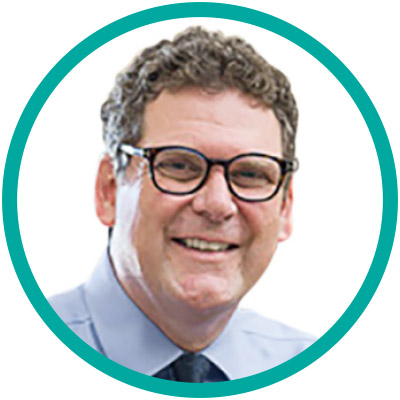 Special Guest Blogger:
Special Guest Blogger:Professor Nicholas Procter
Chair: Mental Health Nursing and leader of the Mental Health and Suicide Prevention Research Group, Sansom Institute for Health Research
Let’s ask what’s happening to you… not what’s wrong with you.
In 1979 I met and later married (in 1988) a woman with family bonds to the former Yugoslavia. Through my relationship with her and her family I learned a host of cultural situations, a new language, and developed relationships with many from that region. Three years after our wedding, in June 1991 we travelled to the Balkans to meet my partner’s family and ‘take in’ the places of her homeland. Within days of our arrival war had begun in the former Yugoslavia.
There was widespread military activity in the area bordering our suburb. I wanted to create a written record of my thoughts and experiences surrounding events as they unfolded. However given the stressful nature of what was happening and stories and fears of air-raids this became difficult to do. The urgency and uncertainty of the situation being faced by the people forced those around us to act in an erratic and hasty manner. Cars travelled the short and narrow streets at high speed only to screech during sharp breaking and emit pressured sounds of car horns. In conversation, decisions and plans were being made at one moment only to be changed in light of new, mostly unconfirmed information.
The initial difficulty I had at the beginning of the war in former Yugoslavia, was that the war had caused people to speak more quickly. There was a distinct pressure of speech both on the street, among people in our apartment building and on the radio and television news as well. Despite a reasonable working knowledge of the language I could not keep pace with what was being said to or around me. The lack of clear information brought home to me in a most powerful and frightening way that I was powerless to improve my sense of personal safety. It also caused great pressure on my partner, who, given her better language skills, was then forced to undertake a key interpreting role.
With limited understanding of what was happening and almost no mobility outside my immediate area, I was becoming increasingly concerned about the situation and knew that I wanted nothing else other than to leave the country. We did this, travelling on a train being used to evacuate refugees.
It took several months for the events that I had experienced when in the former Yugoslavia to surface in my conversation with others. In practical terms conversations could quickly turn to debates about the conflict, often expressed as polarities of ‘right and wrong’.
More fitting to my professional and personal life as a mental health professional is concern for the deeper meaning structures that surround experience and the way this intersected with the health and wellbeing of others.
Many living in Australia have strong cultural and spiritual connections to the region. Such strong ties also meant a pre-occupation with the safety of loved ones. Mental health could no longer be seen as a localised phenomenon – it was now emerging as something that transcended the national settings within which people live. A global event unfolding on our television screens was being beamed into living rooms around the world. Images came with invisible bonds to those with intimate emotional connections. The health effects were profound and included feelings of frustration, sadness, intrusive and distressing thoughts, poor sleep and bouts of emotional exhaustion.
Such experiences taught me about mental health and wellbeing in new ways that re-defined the drivers of mental distress. Health, and mental health in particular, was inextricably linked with the effects of long distance grief and dislocation. Physically people might be here, but emotionally they are ‘over there’. Thinking about mental health this way also helps me to understand a person’s conceptualisations of distress and the explanatory model they bring to their troubles. Outside observers can always interpret the behaviour of others in distress from their own viewpoint, but they will not be able to understand the crucial individual context behind such distress, fear or emotional turmoil without the active assistance of the person concerned.
A possible starting point for dialogue towards a deeper understanding of distress is to begin with reframing of the question, ‘What is wrong with you?’ to, ask ‘What’s happening to you?
This type of questioning acknowledges that the person has a story to tell on their terms using their language. It also takes us closer to the tenets of person-centred approaches in mental health. Such approaches also recognise distress in the context of the whole picture to better understand where a person has been in their life and what matters most to them – now and in the future.
By Professor Nicholas Procter
Chair: Mental Health Nursing and leader of the Mental Health and Suicide Prevention Research Group, Sansom Institute for Health Research
Professor Nicholas Procter – Chair: Mental Health Nursing and leader of the Mental Health and Suicide Prevention Research Group, Sansom Institute for Health Research
Professor Procter is UniSA’s Chair: Mental Health Nursing and leader of the Mental Health and Suicide Prevention Research Group. The strategic intent of his work is to partner with people and organisations who can use research to make a difference outside of academia, particularly in consumer and carer engagement and public policy. His most recent book Mental Health: A person-centred approach (Cambridge University Press) is in its second edition. In 2017 Professor Procter was recipient of SA’s highest mental health honour, the Dr Margaret Tobin Award, and SA Health’s Mental Health Excellence Award for Partnering with Lived Experience.
2018 Mental Health Week: October 7–13
Special Guest Bloggers

The post Professor Nicholas Procter: Let’s ask what’s happening to you… not what’s wrong with you appeared first on .
]]>The post Karen van Gorp: Miraculously cured, but shattered appeared first on .
]]>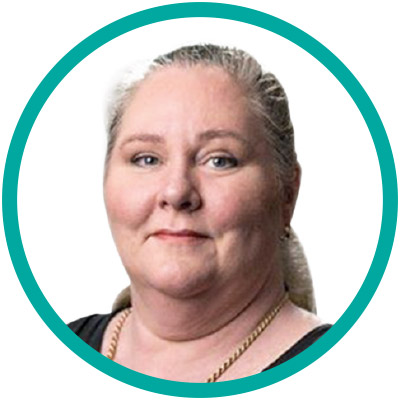 Special Guest Blogger:
Special Guest Blogger:Karen van Gorp
Senior Policy Adviser – Business SA
Miraculously cured, but shattered
In mid 2013 I was diagnosed with advanced melanoma. I had already taken time off work to deal with significant surgery and radiotherapy and was just beginning to think about returning when I was hit with this latest physical and mental challenge.
I was dying. I needed to make plans for my family while facing the daunting prospect of no longer being around to share their lives. I arranged to be referred to the Southern Adelaide Palliative Care service to set up systems to help my family – mother, husband and most importantly my children aged 4, 9 and 11 deal with the impact of my death.
Instead I met an amazing counsellor who provided me with the support I didn’t realise I needed or was entitled to. I was also very lucky, as in October 2013 I was accepted on a clinical trial for a drug which, for me, worked incredibly well.
When you are dying it is acceptable to cry and rage – you try to avoid doing it in front of your family as you don’t want to burden them and of course, you want to appear strong. However, you can access support groups, where it’s ok to cry, and counselling and friends are very supportive.
It is not so acceptable when you appear to have been miraculously cured. You are expected to be ecstatically happy and ready to take on the world. Instead I was shattered, exhausted and not able to feel any happiness.
After yet another scan showing no identifiable disease I let loose at my mother who had been a rock for me – I could hear myself and could not stop my rage. I would burst into tears or become inexplicably angry without warning. I lost all confidence and felt unable to speak to anyone or make any plans. I was confused and anxious about how I felt and finally, embarrassed, I spoke to my counsellor. I was diagnosed with post-traumatic stress disorder. I felt reassured that I was not the only one. But I also felt like a fraud. There was nothing wrong with me, my life had just been saved, I hadn’t been in a war…
At the same time, I was returning to work at Business SA. The importance of the workplace in recovering from cancer or other diseases or illnesses can never be overestimated. My work became part of my healing. My manager, HR manager and all the staff were supportive and helped me very gradually improve my confidence, recognising not only the physical but also the psychological impact of my trip to hell and back.
While I was unwell my manager had regularly called or texted me to check on how I was. I was invited to all social events and my work email account was left open for me to check in from time to time. When my paid leave ran out I was on leave without pay but always part of the workplace. When I was ready I was encouraged to return to work for as many hours as I felt comfortable doing. I worked for one day a week irregularly impacted by fatigue and I realise looking back, my mental health issues. I was still receiving treatment under a trial, flying to Melbourne once a fortnight and having scans every three months. It has taken me years to learn how to deal with the “scan-xiety”, the mind-numbing fear that builds up prior to your next scan and, for me, the confusing anger that bubbles up after being told the good scan results. I still get cranky after receiving my good scan results, but I know how to deal with the build up, understand what is happening and can deal with it thanks to the help and support I received.
For that first year my husband’s work also supported us which meant he was able to attend important doctors’ appointments in Melbourne, as they made sure his Melbourne trips coincided with my scan appointments. The emotional support that gave me was invaluable and enabled my husband to be part of the discussion, keeping his own stress down.
I remember being told to tell your story over and over and over… Sally Crossing Cancer Voices. I did not realise it was not for those hearing my story as much as it was for my own healing.
It started with a Patients as Teachers presentation to third-year medical students and I was encouraged to share my story at work through our internal staff newsletter. It was difficult sharing with 15 third-year med students, it was terrifying standing before 200 people at a gala dinner and then before several hundred in a packed-out international conference. People have asked “is it difficult digging that up each time?” I have realised that, although every time I prepare to speak I cry at the memory of my journey, I am also given the opportunity each time to look back and realise how far I have come, how the help of my workplace and my speaking roles have helped me to regain my confidence and balance my mental health.
Ill health and recovery is a long and tough road, and we need to remember that not only does it impact on our physical selves, but it’s normal to feel the psychological changes as well.
By Karen van Gorp
Senior Policy Adviser – Business SA
Karen van Gorp – Senior Policy Adviser – Business SA
Hailing from the NT, Karen van Gorp has lived and grown her family in South Australia over the last 20 years. A Senior Policy Advisor at Business SA, Karen’s portfolio includes Human Services Not for Profit organisations, workplace relations, diversity as well as representing Business SA on the Mental Health Commission Wellbeing Steering Group. Her background is in Workplace Relations, mainly with employer organisations in the NT, Queensland and South Australia. Karen, in the past 4 years, has also taken on a SA volunteer Facilitator role which includes running a support group, consumer advocacy and public speaking as well as Board Director roles for two not-for-profit organisations.
2018 Mental Health Week: October 7–13
Special Guest Bloggers

The post Karen van Gorp: Miraculously cured, but shattered appeared first on .
]]>